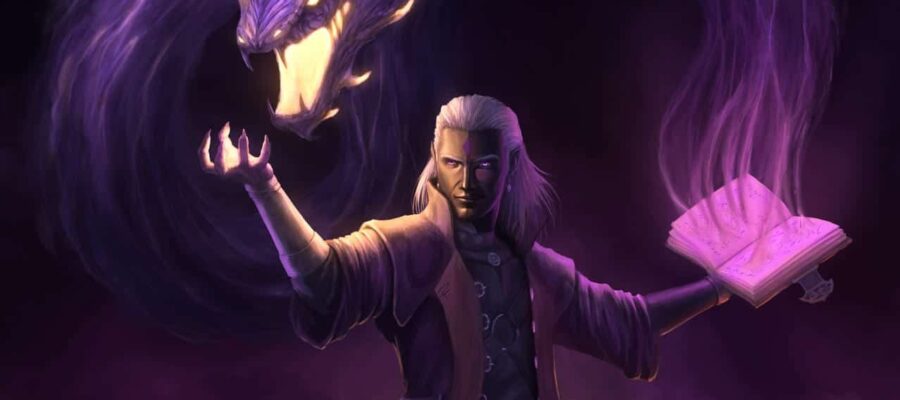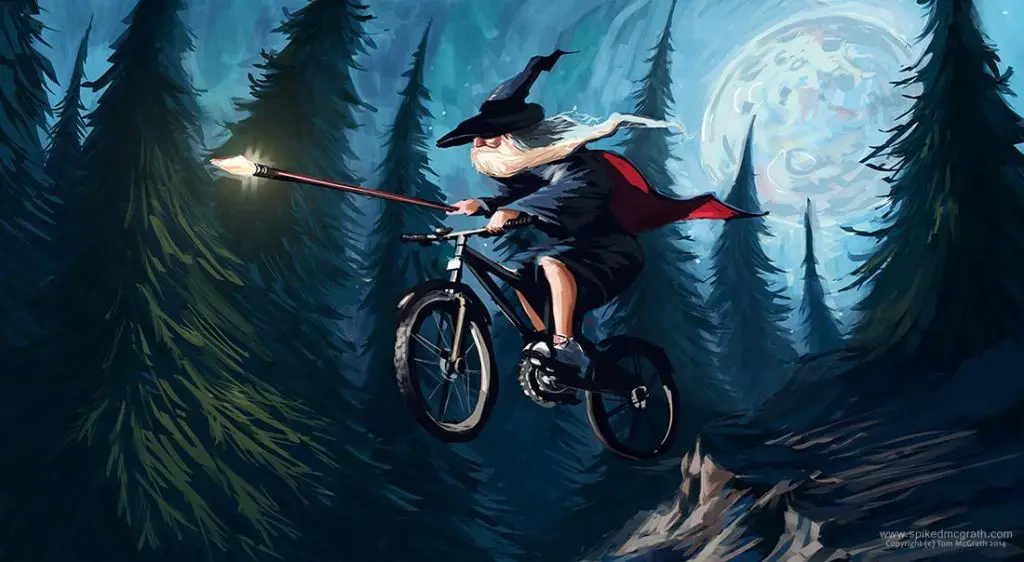D&D 5e Wizard feats featured art “Cambion Wizard” by captdiablo. Creative Commons License.
This article contains affiliate links that add gold to our coffers.
Feats are powerful customizations when coupled appropriately with class abilities. Some feats are better than others, so I’ll direct you to feats that are worth your Wizardly time. Spellcasters used to have slim pickings for feats to augment their spellcasting, but Tasha’s Cauldron of Everything gave spellcasters various new options. Having feats spread out through several books can make it difficult to settle on which feats are best for a Wizard. I’m providing a noble service by summarizing the best feats (and several duds) to enhance and expand your spell-slinging! My feat recommendations come from officially published sources (PHB, TCoE, and XGtE, with Elemental Evil referenced for Svirfneblin Magic).
I’ve organized my feat suggestions by the following categories:
- Best Wizard Feats D&D 5e (Top 7)
- Augmented & Expanded Spellcasting Wizard Feats
- Escape & Mobility Feats for Wizards
- Healing & Durability Feats for Wizards
- Teamwork Feats for Wizards
- Niche Feats for Wizards
Best Wizard Feats D&D 5e (Top 7)
These are the feats you are most likely to want for your Wizard. They’re generally strong options that complement a Wizard.
#7 Metamagic Adept
While only a few Metamagic options are relevant for a Wizard with few Sorcery Points, there are some winners. My favorite is Subtle Spell to hide a Charm Person or avoid Counterspell by casting imperceptibly.
#6 Resilient (Constitution)
You can boost your hit points if your Constitution is odd. Concentration saving throws are incredibly important for Wizards, so Resilient (Constitution) is a tempting option to bolster those saves.
#5 Shadow Touched
While inferior to Fey Touched, this solid feat still nets you +1 Intelligence, Invisibility, and an additional spell.
#4 Alert
You want to move early in the Initiative order. Moving early can transform a combat encounter. Controlling the battlefield and locking down enemies before they can rev up is essential to victory and survival. A Wizard whose turn is last could be in big trouble.
#3 Lucky
This versatile feat can bolster your saving throws to maintain concentration and any other saving throw that you are desperate to pass. It’s difficult to argue with the versatility of Lucky.
#2 Telekinetic
You boost your Intelligence and gain a reliable way to use your bonus action. Wizards typically don’t have features that utilize bonus actions, so this is extremely useful. You can move yourself or an ally like a free Disengage. Pushing enemies into an area-of-effect spell can double a spell’s effectiveness.
#1 Fey Touched
Adding two spells to your “always prepared” pool is fantastic. Misty Step is one of the best spells to have, and the other options here are desirable. You also boost your Intelligence.
Augmented & Expanded Spellcasting Wizard Feats D&D 5e
- Drow High Magic (Drow Elves only): Casting Detect Magic at will is going to wear down your DM’s patience, heh heh. Picking up Levitate and Dispel Magic is an excellent boon. These spells will often be useful. It’s good to be a Drow! These spells will rely on your Charisma, so be careful using Dispel Magic against high-level spells in this way. The feat does say you learn the spells, though, so you can cast them with spell slots and use your Intelligence if you need a good roll.
- Eldritch Adept: You’ll probably pick this feat so you can cast Disguise Self at will. Devil’s Sight and Eldritch Sight would be useful, too. Several other invocations may interest you, but I only recommend this feat if you’re going for a particular concept that it can lend itself to. You can gain Mage Armor at will for constantly recharging your Arcane Ward if you’re playing as a Wizard of Abjuration.
- Fey Teleportation (High Elves only): You’ll gain a Misty Step for emergencies and boost your Intelligence. Learning Sylvan is ok, but languages rarely matter.
- Fey Touched: Another option for a Misty Step up your sleeve. You’ll learn one first-level spell from the school of divination or the school of enchantment. There are interesting spells available in this way that would normally be unavailable to a Wizard.
- Flames of Phlegethos (Tieflings only): Far superior to Elemental Adept, this feat may actually boost your damage in meaningful doses. The flames that wreathe you are cool as well. Another way Flames of Phlegethos stomps on Elemental Adept’s face is that it boosts your Intelligence score. I would have to pick this feat if my spellcaster specialized in fire, and I was willing to select Tiefling for the character race.
- Magic Initiate: Learn more magic so you can effectively have another spell prepared. You won’t boost your stats with this one, though. I recommend spells that you don’t often need or in bulk, like Mage Armor, Absorb Elements, or Feather Fall. It’s an ok feat for expanding your spell pool. You could technically gain healing spells like Healing Word if you need healing options that Intelligence won’t boost.
- Metamagic Adept: Due to the limitation on Sorcery Points with this feat, choose your Metamagic carefully. Consider the spells you’re typically casting so you can figure out what kind of augmentation would be helpful. Here are the eligible Metamagic options and what I think of them for a Wizard:
- Careful Spell: Hypnotic Pattern is an excellent example of a pass-or-fail spell with an area of effect; you can incapacitate foes while keeping allies safe from friendly fire. I recommend selecting Careful Spell if your allies are constantly messing with your aim as you try to avoid harming them with your spells. It’s unfortunately tied to your Charisma, but the minimum number of creatures you can protect is one. If your party has a solo martial character running into battle, one creature saved is enough.
- Distant Spell: High-level spells get a lot of literal mileage out of this Metamagic because they tend to have much higher casting ranges than low-level spells. Otiluke’s Freezing Sphere, for example, would have a range of 600 feet. This may be more useful if you play with actual battle maps. Theater of the mind will usually allow you to be in the ballpark for your spell ranges.
- Empowered Spell: Deal slightly more damage… sometimes. It’s also tied to your Charisma, which isn’t ideal for a Wizard. Probably pass on this one.
- Extended Spell: This usually won’t matter, but you should choose it if your spells are constantly ending before you’ve finished using them.
- Quickened Spell: Bladesingers can use this to great effect. You can cast Haste as a bonus action and attack with your action.
- Seeking Spell: You might as well choose the Lucky feat instead…
- Subtle Spell: Useful for illusions and enchantments, but you can also become immune to Counterspell when you cast a spell that doesn’t require material components.
- Transmuted Spell: Useful if your damage-dealing spell selection is limited. Changing the damage type of a spell usually won’t make a difference. Poison spells like Cloudkill would do much better as thunder damage, though…
- Twinned Spell: You’ll be limited to using this once per long rest on a second-level spell or twice per long rest on a first-level spell or cantrip. Only select this Metamagic if you often use single-target spells of these levels. Tasha’s Hideous Laughter and Suggestion are good examples. Your action economy will be far more efficient with a twincasting effect like this Twinned Spell.
- Shadow Touched: Invisibility is often useful. Your Intelligence can get a boost. You can learn one first-level spell from the school of necromancy or the school of illusion. Disguise Self and Silent Image are worthy choices.
- Spell Sniper: Improve your spell attacks’ casting ranges while ignoring non-full cover. It’s nice to learn additional cantrips, too. However, there aren’t many spell attack spells on the Wizard spell list, so this feat isn’t great.
- Telekinetic: Improve or learn the Mage Hand spell. This is a versatile cantrip that gets me excited to play. It’s one of the best feats for Wizards, in my opinion. Wizards don’t typically use their bonus actions during combat, so this fills in the action economy and boosts Intelligence.
- Telepathic: Learn to Detect Thoughts while boosting your Intelligence. Some DMs would rule that this feat can make verbal spell components imperceptible to all but your spell’s intended target. If you have a DM that will allow you to cast Suggestion telepathically, this feat may be crazy good. Bards can give someone Bardic Inspiration with this feat, so it makes sense that a Wizard could satisfy verbal components with telepathy. Check with your DM.
Escape & Mobility Wizard Feats D&D 5e
- Fade Away (Gnomes only): Illusionists will have a particular interest in this feat. You can react to damage by becoming invisible. Hiding isn’t guaranteed (need to use the Hide action), but you do become temporarily unseen. You may confuse foes, but you’ll almost certainly cause them to attack you with disadvantage if they pursue you. When your turn comes, maneuver yourself into a better position before revealing yourself.
- Mobile: I normally pick Shocking Grasp to remove an enemy’s reaction with its attack while I run away. Mobile will make it so I can still freely run away without getting attacked if Shocking Grasp missed. My speed will be higher so I can kite an enemy. It’s not as useful with multiple enemies surrounding me, but it’s still handy.
- Second Chance (Halflings only): Force an enemy to reroll an attack that would hit you. Useful once per fight, it’s a useful card to play if you’re attacked unexpectedly. I think you’re better off using the Shield spell as a reaction to defend against all attacks during a round. You should probably skip this feat.
- Telekinetic: Use your bonus action to push an enemy away, so you don’t need to disengage! This feat is so useful and versatile, and it boosts Intelligence. Pick it!
Healing & Durability Wizard Feats D&D 5e
- Artificer Initiate: You’ll only choose this feat if you want to learn Cure Wounds. Your party would need to lack sufficient healing resources to force you into considering this feat. You could choose the Healer feat instead, but this one will give you a tool proficiency and cantrip. These Artificer spells will be improved by your Intelligence score, synergizing well with the Wizard. It might be better to multiclass a level of Artificer.
- Healer: I’ve cited other feats that give you healing spells, so this one isn’t top-tier if you want to add healing to your Wizard skillset. I recommend not selecting this feat.
- Infernal Constitution (Tieflings only): Boosting your Constitution is useful for any class. You need to maintain concentration, so Constitution is essential. Resistances are nice to have, too.
- Lightly Armored + Moderately Armored: You can achieve an Armor Class of 17-19 with medium armor and a shield (depending on your Dexterity score). These feats help you protect yourself if you don’t want to multiclass. It’d be more cost-effective to multiclass, but it’s not for everyone. You could also learn Mage Armor and call it good there if that’s enough for you. These feats will boost your Dexterity or Strength, so that’s a plus.
- Lucky: It’s the darn Lucky feat again. It’s ubiquitous enough that I’d be mistaken not to include it. I find it boring. At least try to roleplay your luck if you choose this feat. Roleplaying instances of luck will set you apart from the common player.
- Resilient: Use this to even out Dexterity or Constitution. Either of those saving throws will be valuable. Dexterity and Constitutions saving throws are common. Constitution is the better stat to choose since concentration saving throws are Constitution saving throws. You’ll be a champ at concentration with this solid feat.
Teamwork Wizard Feats D&D 5e
- Bountiful Luck (Halflings only): As one of my favorite feats, it’s an automatic feat for me if I play a Wizard Halfling. Your allies will thank you every time you help them reroll a one. Bountiful Luck is usable during each round, so don’t hold back unless you’re saving your reaction for Counterspell. You’ll need to keep your allies within range (30 feet). I recommend selecting survivability feats, so you maintain a slight distance from the action.
- Telekinetic: This feat is incredible for a Wizard. Bonus actions often go unutilized by Wizards, so they can afford to use it as they push creatures and objects around. You can maneuver allies into better combat positions, shove foes off ledges, or cause objects to fall and break on enemy noggins. There are many creative uses for Telekinetic as it’s one of the best feats in the game, in my opinion. It’s a powerful upgrade if you already have Mage Hand as a cantrip.
Niche Feats for Wizards D&D 5e
- Alert: War Magic Wizards specialize in rolling high on Initiative rolls. This feat will make protect them from ambushes while further augmenting their impressive Initiative rolls. Winning Initiative is very important for any Wizard so they can control the battlefield and avoid damage.
- Elemental Adept: This feat is usually a trap! Do not choose this for the damage die boosts when rolling ones. You should only choose this feat if you are specializing or limited to certain damage types for your spells and you’re fighting many creatures with resistance to your primary damage type. Even then, I don’t actually recommend this feat. The math isn’t flattering for the turn-ones-into-twos ability. I researched to find a spell that could best benefit from Elemental Adept. Melf’s Acid Arrow and Vitriolic Sphere were good candidates, but even those prime spells would barely see a difference in their average damage from Elemental Adept.
- Mage Slayer: Abjurers, Bladesingers, and War Mages will love the idea of breaking the concentration of rival spellcasters. Bladesingers can easily utilize the reactionary attack made available by nearby spells being cast. Abjurers will already have advantage on saving throws against spells at higher levels, but other Wizards will be grateful for it if they get close to enemy spellcasters.
- Mounted Combatant: Necromancers can ride through battle while making Vampiric Touch spell attacks at melee range with advantage against humanoids and other medium-sized creatures. After attacking, their mounts can get them out of harm’s way. I think this sounds cool, and mounts are handy for Wizards.
- Observant: Boost your Intelligence while making sure your DM is forced to reveal all secret doors in your path. Mwahaha! But seriously, being perceptive can save your character’s life. You can consider Observant for your Wizard if your character often misses important details and stealthy enemies.
- War Caster: Like Mage Slayer, aggressive Wizards may want to get close to other spellcasters. War Caster will potentially improve action economy, defenses, and concentration rolls. This is especially useful if you’ve gained proficiencies with armor and shield.
Conclusion
If you’ve learned nothing else from this D&D 5e Wizard feats article, I hope you’ve learned that Telekinetic is an invaluable feat for a Wizard. I also hope you realize that Elemental Adept is not a good feat. My recommendations are subjective, but they are grounded in experience, game mechanics, and metagame knowledge. I’m confident that you’ve learned something from exploring my summary, and for that, I’m grateful.
Which feats have I been fair or unfair to? What spells have you loved for your own Wizard character? In the comments section below, cast Message to inform me whether you second my feat tastes or hate them with a passion. I’ve been wrong before, so you should consider it a challenge to find any mistakes I’ve made in my analysis! Thank you again for reading. I hope you’ll share this article with your friends to get a discussion started.
Oh, it seems you possess a high Passive Perception score. Before you go, take these secret passageways to discover more content about feats and character concepts!





you seem to have recommended Telekinetic 3 times. is there a reason?
Yes, my recommendations are based on what a player wants to get out of a feat. Telekinetic fits into several buckets.